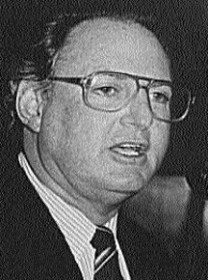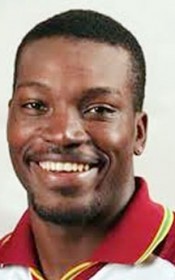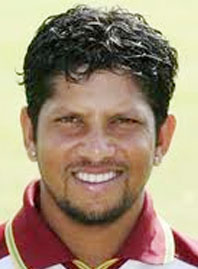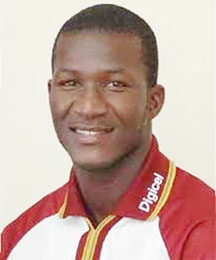 For the twelfth time in the 13 years since Richie Richardson’s interrupted tenure formally ended and Courtney Walsh took over for the second time, the West Indies Cricket Board (WICB) is again seeking someone to take hold of the poisoned chalice of the captaincy.
For the twelfth time in the 13 years since Richie Richardson’s interrupted tenure formally ended and Courtney Walsh took over for the second time, the West Indies Cricket Board (WICB) is again seeking someone to take hold of the poisoned chalice of the captaincy.
The task is as difficult and potentially contentious as it was when Courtney Walsh was deposed by Brian Lara in 1997, when Jimmy Adams filled the breach after the pressures forced Lara to take a break from the game after two years and for every change since – Adams, back to Lara, to Shivnarine Chanderpaul, to Carl Hooper, to Lara again, then onto Ramnaresh Sarwan, Daren Ganga, Chris Gayle, Floyd Reifer and back to Gayle.
This time, the field is limited. Yet, for the WICB to achieve its recently published goals, decisive, dedicated leadership is critical at all levels. Sadly, it is a commodity in very short supply throughout West Indies cricket as the results on the field and the chaos off it attest.

The board’s ambitious vision is to develop a winning squad between now and the World T20 tournament in 2014 and the 2015 World Cup. Although it acknowledges that producing “consistently winning West Indies Test teams will take a longer period”, it identifies the West Indies ‘A’ team programme and the Sagicor High Performance Centre (SHPC) as keys to success.
In other words, it is a continuing process in which the captain is as critical as the soon to be chosen manager, the coaches, the players and, not least, the board itself.
The incumbent Chris Gayle, his status increasingly tenuous after a promising start after he was appointed in 2007, and the most recent vice-captain Dwayne Bravo have effectively eliminated themselves from consideration by declining theWICB’s offer of an annual retainer contract. They have each “indicated that they remain committed to West Indies cricket and are available for selection to the West Indies team” but their decision not to
bind themselves to the WICB renders that commitment conditional.
They are high-profile professionals seeking to maximise their earnings with lucrative periods in the Indian Premier League (IPL).
Australia’s Big Bash and the other T20 extravaganzas likely to follow, topping up with what they can earn when picked by the West Indies, as the WICB emphasised that those without contracts can be.

Yet their availability cannot be guaranteed, a prerequisite for any captain. As it was, Gayle hustled back from his IPL series with the Kolkata Knight Riders last year to arrive in London just two days before the first Test against England.
The year before, Bravo extended his stay with the Mumbai Indians so long that it took a private jet to get him back to Kingston in time for the first Test against Australia.
It was no way to run a professional international outfit, sporting or otherwise. At 26 with the background of 37 Tests, 107 ODIs and 22 T20s to go with his infectious, all-round energy, Bravo surely has it in him to fulfil the job the WICB is seeking. It is a pity he has chosen a different path.
Apart from Gayle and him, others remain who have led the West Indies in the past. Yet none appears in line again. The ever dependable Chanderpaul is now 36 and in the twilight of his career.
Even so, he has openly stated that he is not interested in repeating his traumatic experiences in 2005-06, when he remained at the helm while the other leading players pulled out of the tour of Sri Lanka and were reinstated three months later. Sarwan and Denesh Ramdin (who skippered in one T20) have not had their contracts renewed and Daren Ganga, a strong candidate following his widely lauded captaincy in the Champions Trophy a year ago, didn’t have one.

Sarwan, groomed for the job for some time and installed when Lara retired in 2007, appeared to have become disheartened by the misfortune of a dislocated shoulder that ended his captaincy after just two Tests.
He quit as vice-captain to Gayle prior to the 2008-09 New Zealand tour without explanation (Ramdin took his place) and was slated for his “extremely indifferent attitude and sporadic approach towards fitness” in the WICB’s explanation for denying him a contract. So who does the WICB turn to? The signs point to Darren Sammy.
While such key players as Sarwan and Jerome Taylor were openly chided for their attitude and denied a contract, he is one of only two players granted a category B deal (Sulieman Benn is the other, based on his performances over the last year, not his disciplinary record). Although not stated, it was clearly a promotion based more on Sammy’s character, and his age (26), than his cricket.
It is no secret that his leadership potential is as highly regarded by those in high places as, on all the evidence, his all-round play is underestimated by the selectors. His swashbuckling hitting and steady medium-pace made him a main man in the World T20 tournament and the limited-overs contests against Zimbabwe and South Africa. But he played only one of the six Tests in the relevant period.
Indeed, he has appeared in only seven of the 26 Tests since his remarkable seven-wicket return on debut against England in 2007 and his record is modest. The WICB missed the chance to give him captaincy experience last year when they put Floyd Reifer, aged 36 and 10 years after his previous Test, to lead against Bangladesh and in the subsequent Champions Trophy. To now pass on that responsibility that has brought down many more eminent West Indians would be a daunting test of his fortitude.
For all the repeated West Indies’ failures under a host of recent, more reputed
captains, he could expect constant gibes about his ability, the only antidote of which would be to prove he is worthy of his place, whatever version of the game.
Like Chanderpaul couldn’t, he would have to gain the support of senior members still resentful that he did not join their strike last year, opting to turn out against Bangladesh instead.
With WICB president Julian Hunte and chief executive Ernest Hilaire also St.Lucian, the charge of the Lucianisation of West Indies cricket would inevitably follow – just as they did when the Trinidadian triumvirate of president Ken Gordon, chief executive Bruce Anansen and captain Brian Lara were at the top.
Even if only by a process of elimination, Sammy’s promotion would be a bold
move. It might just be the right one.




